

YOUR DONATION COUNTS
Help make our community a better place by giving to families and groups that face significant challenges. Together we can make sure that no wish goes unfulfilled this holiday season.



Help make our community a better place by giving to families and groups that face significant challenges. Together we can make sure that no wish goes unfulfilled this holiday season.
Dear Readers,
Welcome to the 2024 edition of Share the Spirit, the annual East Bay Times holiday fundraiser.
Beginning Nov. 28, Thanksgiving Day, our award-winning journalists will introduce you to individuals, families, and groups coping with significant challenges or helping to make our community a better place. Share the Spirit is our way of working with generous readers like you to assist these neighbors in need in Alameda and Contra Costa counties.
We hope you read the 2024 Share the Spirit stories that will be published in the East Bay Times and continue with full stories throughout the holidays. You can also stay updated on the 2024 Share the Spirit initiative by visiting www.sharethespiriteastbaytimes.com/sharethespirit.
Donations may be made online at sharethespiriteastbay.org/donate, or checks can be made out to “Share the Spirit Fund” and mailed to Share the Spirit, P.O. Box 2127, Dublin, CA 94568. Contributions of all sizes are welcome and are tax-deductible.
Your donations stay in the East Bay to make this a better place to live and thrive. If more money comes in than is needed to grant a specific wish, we will use the extra funds to pay for other wishes.
The East Bay Times is proud to come together with the community once again to improve the lives of Bay Area residents.
Thank you for your generosity.
Sharon Ryan
Publisher, East Bay Times
P.S.: Your name, if you choose, will be included on a published donor list in the newspaper and online. Our small way of showing gratitude for your support.
Donors and dedications will be honored publicly in print and online Please allow my name to be published Yes


By Nate Gartrell ngartrell@bayareanewsgroup.com
Mila Rampola’s life has been full of overcoming struggles. Now, as she spends her days helping others in the same predicament, those experiences have come back to uplift her.
Rampola, a peer support worker at Bay Area Community Health, is dedicating her life to helping folks overcome substance use disorder. It is a daily, lifelong struggle but she’s wellequipped to dish out assistance, because 20 years ago she was the one seeking it.
Back then, as a single mother, her life was in turmoil amid personal health concerns and drug addiction. Reluctant at first, her desire to build a better life for her daughter finally pushed her to seek help.
Currently undergoing training as a drug and alcohol counselor, Rampola is set to intern for BACH next year. When she’s not in Fremont, she spends her time pursuing drug addiction counseling studies at Merritt College in Oakland. “I tell my daughter to this day — she’s 31 now — I tell her, ‘You and my grandson are the reason why I fight,’ ” Rampola said.
Bay Area Community Health, based in Fremont and San Jose, offers medical treatment, addiction counseling and other health services to tens of thousands of people every year.
To better assist underserved communities, BACH has mobile units and outreach teams who regularly frequent local encampments to bring the health services with them.
“We go out four days every week, give out kits, give out Narcan (to prevent fentanyl overdoses),” said Veronika Rodriguez, a supervisor in the substance use disorder program at BACH.
BACH served 65,900 people last year and is on pace to serve a similar patient base in 2024, according to Development Director Lucy Hernandez.

Donations will help Bay Area Community Health support 350 clients dealing with substance use disorders by offering a variety of services, including testing for opioids, HIV and hepatitis C and providing access to treatment; connecting people to healthcare services; and offering peer support programs.
Goal: $40,000
By Martha Ross mross@bayareanewsgroup.com
Pretty much every waking moment of every day, Enis Martinez tends to the needs of her five children, including a 4-year-old son on the autism spectrum and twin 23-month-old daughters.
Living in a two-bedroom Concord apartment, Martinez gets her children up in the morning, feeds them and ferries her two older children, 8 and 11, to and from school. While 4-year-old Jayden spends a couple hours each day at a special program for children with autism, Martinez still has Hannah and Alanah. The two toddlers constantly look to her for attention or if they need comfort when they’re frustrated or tired.
She doesn’t get much help from her estranged husband, and doesn’t have family nearby who can help. It’s no wonder, then, that Martinez looks forward to the break she gets several hours each week by leaving her children at the Bay Area Crisis Nursery.
Located in Concord, the nursery has become an invaluable service for parents, whose worlds have fallen apart or who are overwhelmed, stressed out and in need of a safe, nurturing place to leave their children, whether for a few hours a week or for longer periods of time. The nursery is a free, 20-bed residential shelter for young children, ages newborn to 5 years old, serving about 250 children a year.
Parents bring their children to the nursery for all kinds of reasons, including homelessness, job loss or mental health or medical emergencies, said executive director Tara Legaspi.
The nursery also invites parents to pick up free diapers, formula, toiletries and food from its Food and Diaper Bank. It also offers free produce on Tuesdays and a lobby “boutique,” where parents can find free children’s clothing, furniture, toys and baby supplies.
“We want them to know they can always turn to us,” Legaspi said.

Donations will help the Bay Area Crisis Nursery provide 250 hours of childcare and emergency shelter services to young children ages 0-5 living in poverty with families facing homelessness, domestic violence, medical needs, and other emergencies.
Goal: $10,000
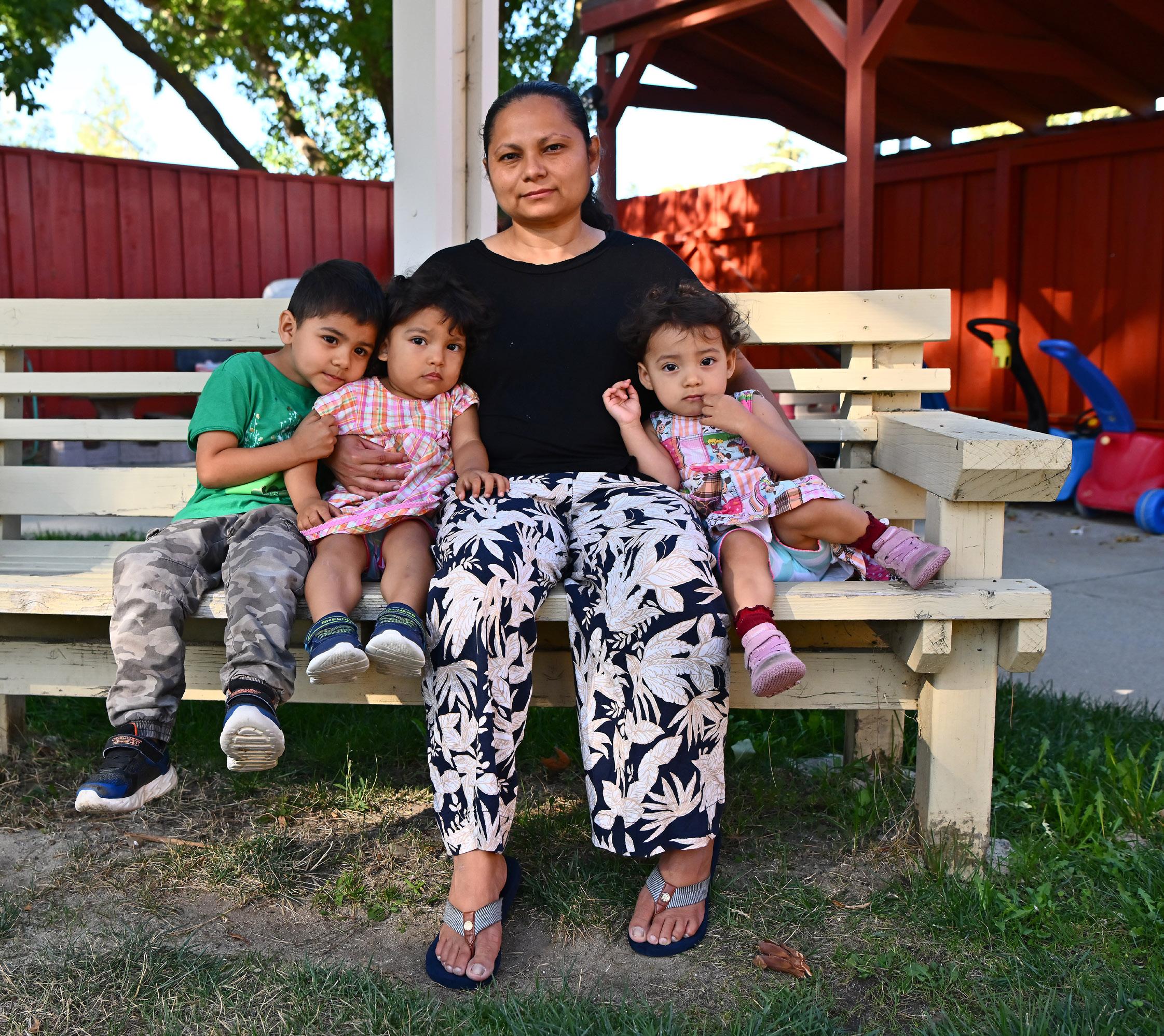

By Justice delos Santos jdelossantos@bayareanewsgroup.com
Nita Simpson has lived more lives than many.
She’s coached basketball. She’s coached volleyball. She’s coached boxing. She’s run a record label. She’s been a radio personality. All of these phases of her life have allowed her to find her purpose.
Simpson is the founder and CEO of Battle Tested Kids, a nonprofit organization that formed in 2019 and provides mentorship and sports training for lowincome and underserved youth in Oakland.
“It’s being able to see what a person is lacking and what a situation is lacking and then being able to fill those gaps. That seems to be my gift,” Simpson said. With that gift, Simpson and her organization have been able to influence members of the next generation.
Like Jamahl Foster, one of the first people who Simpson ever mentored. She began coaching him in basketball when he was in eighth grade, and she wasn’t afraid to challenge him. Foster recalls learning the importance of “extreme numbers,” like making 1,000 shots per day, and running around a gym while carrying a rice bag.
Simpson helped Foster connect the work ethic needed to succeed in basketball with the work ethic necessary to succeed academically. Upon graduating from KIPP King Collegiate High School in San Lorenzo, Foster graduated with a degree in kinesiology at Cal State East Bay. Currently, the 29-year-old works as a financial consultant and personal trainer while serving as an assistant coach for Battle Tested Kids.
Simpson envisions one day having a dedicated facility, one that will allow the organization to stop renting out other spaces. From there? She wants a fullblown campus.
“It’s just a matter of getting in the room with the right people to be able to make it happen,” Simpson said.

Donations will help Battle Tested Kids to offer camp for 150 underserved youth, and to support and fund three paid internships for at-risk youth wanting to pursue careers in sports, social media management, photography, web design, entrepreneurship or marketing.
Goal: $25,000
By Chase Hunter chunter@bayareanewsgroup.com
Speranza Gonzalez was a runaway — from her mother, from foster homes, from law enforcement — until she met Lakita Williams with Beyond Emancipation, an Oaklandbased foster youth program giving a “hand up, not a handout.”
With the support and community she found in Beyond Emancipation, Gonzalez has bucked the challenges often faced by foster youth and is now pursuing her master’s degree in social work while applying to be a foster parent herself, paying it forward for the East Bay’s foster youth.
Foster youth face a particularly perilous transition into adulthood. Without the traditional safety net of parents, foster youth who age out of the system have a 50% chance of experiencing homelessness, a 69% chance of being incarcerated and face PTSD at twice the rate of combat veterans.
Gonzalez was eventually placed with Beyond Emancipation where she met her mentor Lakita Williams, a housing coordinator for Beyond Emancipation.
Now 25, Gonzalez has beaten the statistics. She is part of less than 5% of foster youth to graduate with a four-year college degree, which she earned from the University of San Francisco.
Now, she’s pursuing her higher education with Samuel Merritt University — a degree she wouldn’t have considered without Williams, she said. Williams, however, feels like all the credit should go to Gonzalez.
“Lakita and I have an amazing relationship, and one that I will hold on to forever,” Gonzalez said, “She showed me that someone can be involved without having to be overbearing.”

Donations will help Beyond Emancipation support young adults with experience in foster care and their children secure stable, affordable housing by providing holistic support, including life skills, education, and career development services.
Goal: $30,000

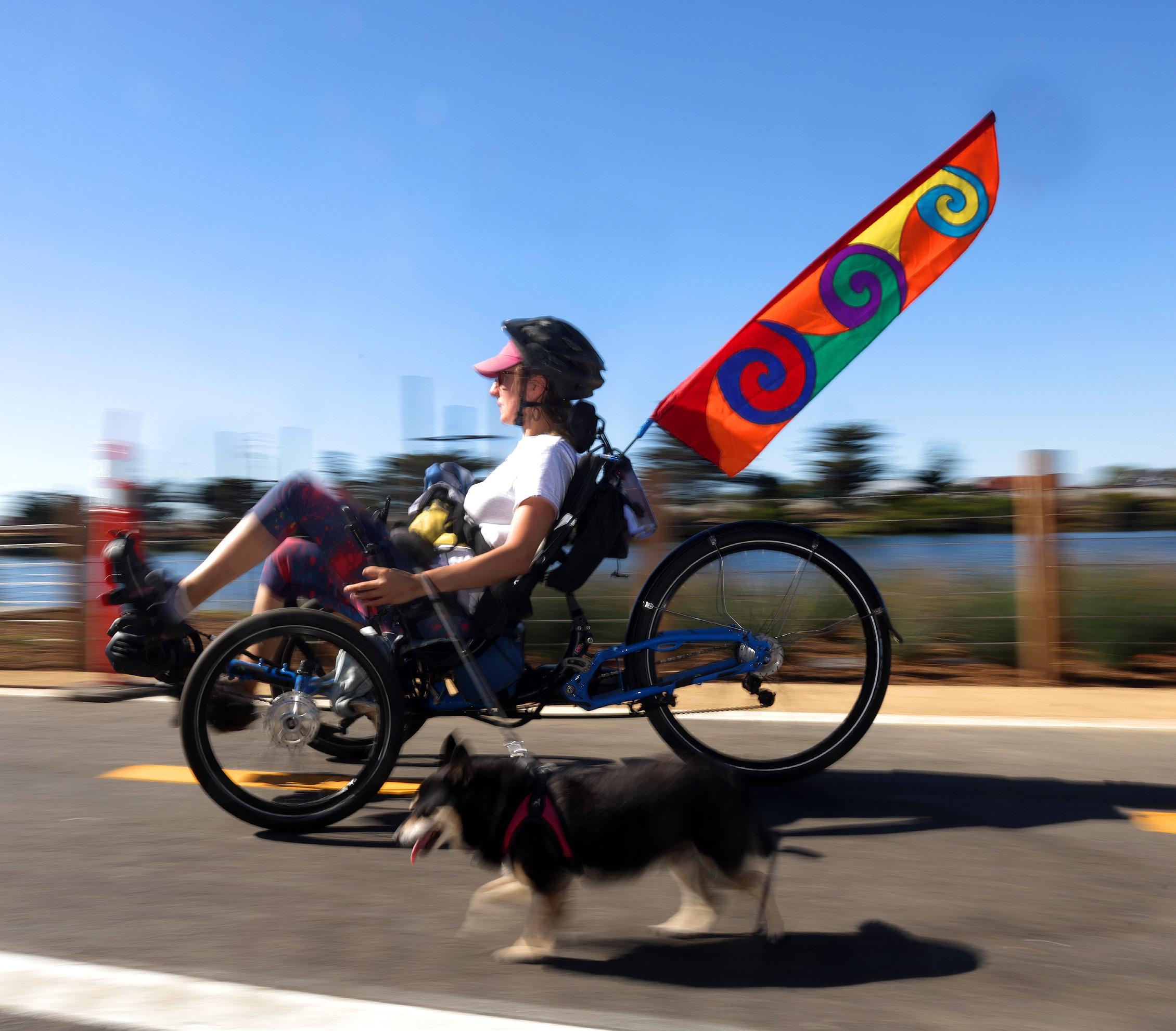
By Jason Mastrodonato jmastrodonato@bayareanewsgroup.com
On a recent Thursday along the beautiful waters of Berkeley’s Aquatic Park, a group of cormorants sunbathed on the dock, buffleheads floated nearby, and Christina Leffmann embraced the freedom she thought she’d never have.
A decade ago, when Leffmann was 23, she suffered a stroke — her third — and her life fell apart. Today, she settles into her power-assisted tricycle, attaches the leash of her 14-year-old dog, Air, and starts to ride.
Riding the paved pathway alongside the glistening waters, Leffmann is as free as the cormorants on a cycling ride that has become a weekly highlight.
It’s all made possible by BORP Adaptive Sports and Recreation, a 48-year-old program that provides access to athletics, fitness and outdoor recreation for people with disabilities.
There are movie nights and peer support groups. There are camping trips and team sports — wheelchair basketball, wheelchair rugby, goalball, power soccer and sled hockey — as well as fitness classes, pickleball and rock climbing. And the adaptive cycling center alongside Aquatic Park houses one of the world’s largest adaptive bike collections and a kayaking program.
Hanging with her new friends, Leffmann has felt inspired. She now lives alone. And she recently began applying to master’s degree programs to study social work.
Because she’s never had a doctor or counselor with a disability, she’s decided she wants to become one.
“I was previously putting the disability bias on myself,” she says.
“But I really like the idea of, it’s not if you can do it, it’s how you can do it.”

Donations will cover staff costs for Bay Area Outreach and Recreation Program (BORP) Adaptive Sports and Recreation to offer 100 open hours at its cycling center over four months.
Goal: $10,000 HOWTOHELP
By Harriet Blair Rowan hrowan@bayareanewsgroup.com
Tiffani Mason knows it takes a village to raise children. And she was lucky to have a network of family and friends nearby when she and her husband, Odell, embarked on the journey of parenting a little over two years ago. As a public health educator, she knew to look for additional resources, too.
After giving birth to her son, Odell IV, she found the Nurturing Parenting Program offered by the Child Abuse Prevention Council of Contra Costa County through First 5 California.
“In the class, they really focus on making sure you take care of yourself,” she said.
Tiffani learned important things about parenting, like the stages of development for her baby’s brain in his first months of life, and age-appropriate expectations as he grew. And the course also taught her skills to improve on her own mental and physical well-being.
The 18-week program gave her one night a week, with childcare and food provided, to focus on herself.
Some families are referred to the program through other local resources, but anyone with young children who lives in Contra Costa County can enroll.
Sonya Smith-Hodge, a class instructor, points to research that shows that lowering stress for parents lowers the likelihood of abuse or neglect.
That’s why self care is one of the focuses of the classes.
“It is cost effective and creates healthier communities to intervene early and provide that support to families,” said Carol Carrillo, executive director of the council. “As a healthy community, (preventing) child abuse is everyone’s responsibility.”

Goal: $10,000 HOWTOHELP
Donations will help the Child Abuse Prevention Council to purchase $200 grocery gift cards for 50 low-income families at risk of child abuse and neglect during the holiday season to use for a special holiday meal, traditional treats for children, or basic needs.

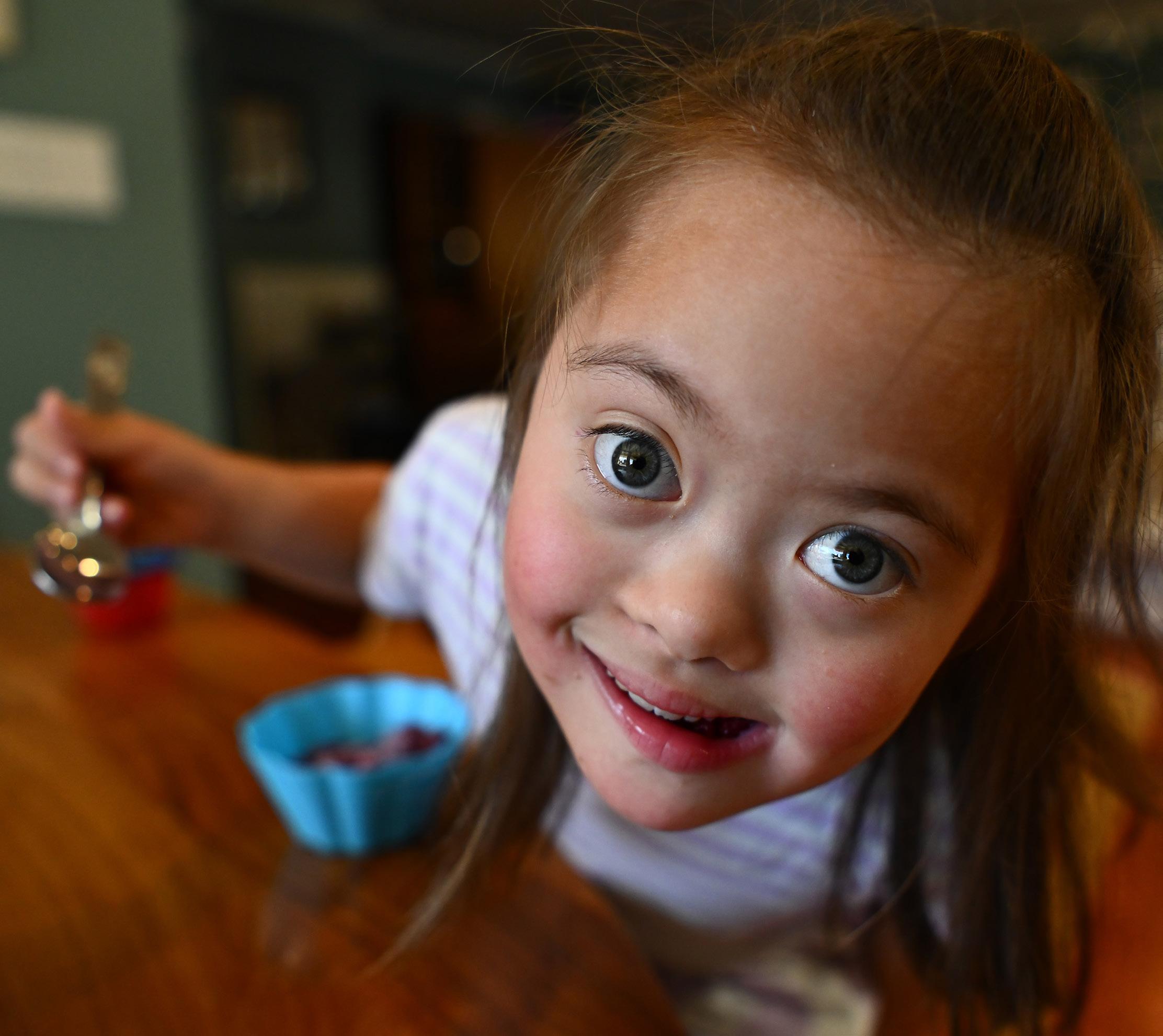
By Joan Morris jmorris@bayareanewsgroup.com
By the time June Lin arrived into the world, five weeks early and weighing 5 pounds, 6 ounces, she already had scores of supporters to help guide her for the rest of her life.
Before she was born, June’s parentsto-be Suzanne and Mike Lin of Danville found out that she had a duplication of Chromosome 21, which meant that she had Down syndrome. Initially, they struggled to make sense of it. What would it be like to care for an infant, child and later an adult with Down syndrome? Would they be up to it?
That’s when the Down Syndrome Connection of the Bay Area reached out to them, offering answers to their questions and a community of parents who have all been where the Lins found themselves.
“We empower, inspire, and support people with Down syndrome, their families, and the community that serves them, while fostering awareness and acceptance in all areas of life,” says Teresa DeVincenzi, executive director of the nonprofit organization.
Down Syndrome Connection, based in Danville but serving the entire Bay Area, works with about 250 children and young adults with Down syndrome, and serves more than 2,600 people through a variety of programs.
That includes the Communication Readiness Program, New and Young Families Support, Information and Referral, the Together, Happy, Respected, Independent, Valued, Empowered (THRIVE) program, the Down Syndrome Educational Alliance, and the Down Syndrome and Autism Alliance.
The organization also offers support groups including the popular Music Therapy, Medical Outreach and Mental Health Alliance groups.
“The Down Syndrome Connection is a critical resource for families with a child born with Down syndrome,” DeVincenzi says, “and we are there for them as their child grows, with programs at every stage in the life cycle.”

Donations will support Down Syndrome Connection of the Bay Area programs, support groups, classes, webinars and workshops, and fund welcome gift packages containing information for parents and handmade baby quilts among other items.
Goal: $10,000
By Kyle Martin kymartin@bayareanewsgroup.com
For the first time in her life, Amelia Esteves soon won’t have her parents’ alarm clocks to rely on.
The 17-year-old student at Northgate High School in Walnut Creek, who was diagnosed with Type 1 diabetes in the fifth grade, has counted on her mom and dad “to make sure my blood sugar is good before I go to sleep.”
“I live with my parents and they have three alarms that they’re good about waking up to. And I’m not yet,” she said.
So the thought of living by herself when she goes off to college makes her feel uneasy.
Luckily, there is a solution in nearby Concord. Early Alert Canines, an organization that pairs dogs trained to detect dangerously low blood-sugar levels with people suffering from diabetes, like Amelia.
Carol Edwards, the organization’s executive director, said the dogs go through a rigorous 18-month training program to get certified to detect dangerous blood sugar levels in humans. Because dogs use about 40% of their brain for recognizing scents, they are the perfect candidates for the job.
Amelia will soon be paired with a furry companion of her own and she said she will welcome the new dog with open arms.
“I think everyone’s goal is to be independent and successful. But for me and other diabetics we have the extra worry of just being able to just stay safe and stay alive,” Esteves said. “Being able to have a dog that can help me with that, that’s also a companion and also a friend that can keep me safe and alive without me having to worry, is great.”

Donations will support Early Alert Canines’ training programs and client follow-up initiatives to help individuals with Type 1diabetes and their families. The nonprofit offers round-the-clock assistance for the lifetime of the dog, including continuous training, guidance on veterinary care, and advocacy to help clients understand and exercise their rights under the Americans with Disabilities Act.
Goal: $5,000

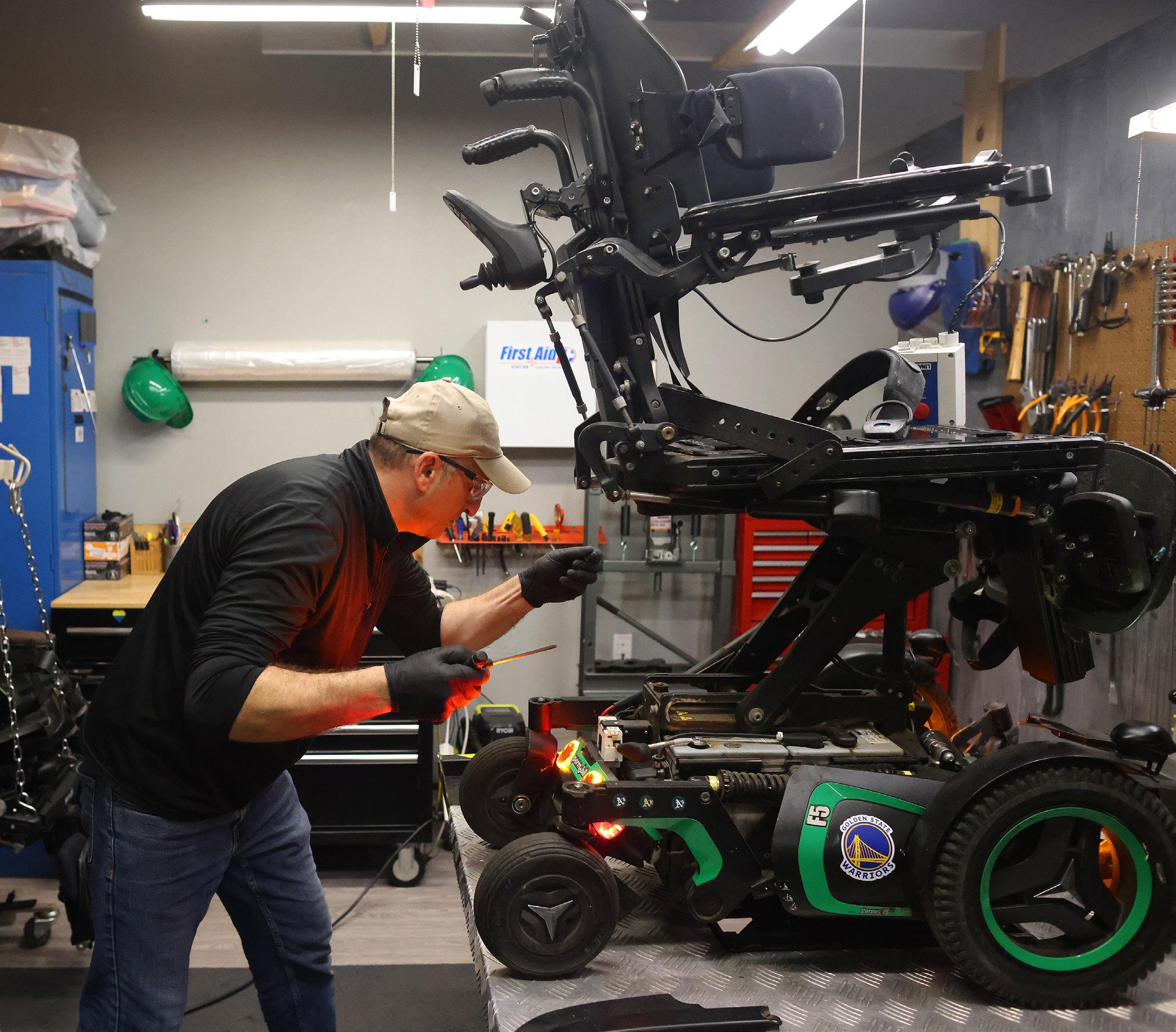
By Kristin J. Bender Correspondent
An East Bay nonprofit organization that provides attendant care, free transportation to seniors and people with disabilities as well as wheelchair repairs will soon mark 30 years in Berkeley — the birthplace of the independent living movement.
Easy Does It Emergency Services was founded in 1995 by Cecelia Weeks, who ran the operation out of her Berkeley home. But over the last three decades, the nonprofit has grown significantly.
So far this year, Easy Does It has answered nearly 12,000 calls from people who need a ride or an emergency caregiver. Caregiving assistance is provided around the clock and rides run between 8:30 a.m. and 11 p.m. The organization also provides a wheelchair rescue program for people who become stranded when their wheelchair malfunctions or breaks.
“They are wonderful, they are very community oriented, they care very much about the services they provide and the community they serve,’’ said Peni Hall, a client who has used a wheelchair for 40 years following a back injury. “They are the AAA for people in wheelchairs.”
The organization was a natural outgrowth of the independent living movement, which began in Berkeley, said Bruce Curtis, the executive director of Easy Does It, who became a quadriplegic following a diving accident in Southern California at age 17 in 1967.
Curtis said the nonprofit organization, which has scores of volunteers and several dozen employees, is unique in America. “It doesn’t exist anywhere else,’’ Curtis said.
“If your wheelchair is how you get around, to have someone you can contact who will actually pick you up if you get stranded is amazing,’’ Hall said.

Donations will help Easy Does It Emergency Services provide 150 hours of repair services, plus wheelchair loaners, to seniors and physically disabled adults and expand service into Albany, El Cerrito and Richmond.
Goal: $15,000
By Sierra Lopez slopez@bayareanewsgroup.com
With a new bed and brown leather couch provided by Grateful Gatherings, Harrison Coleman now feels at home after spending years living out of his car and in a storage unit in Oakland.
His journey to this point wasn’t easy.
The Missouri native, Air Force veteran and clergyman never thought he’d become homeless. He’d always worked to support himself, finding odd jobs while studying theology at San Francisco State University and earning his master’s degree from American Baptist Seminary of the West.
He had community and friends, and was working to build his own congregation in Sacramento.
But he struggled to build a following there and despite his best efforts, Coleman ended up spending more than two years of his life on the streets of Oakland from May 2021 to August 2023.
A heart attack put him in the hospital and from there he was taken to a temporary shelter. Being placed in an apartment building for seniors was a key step toward Coleman’s recovery. But after weeks of sleeping on the floor, getting a bed was his next priority.
That’s when Grateful Gatherings stepped in and provided Coleman with a couch, bed frame and brand new mattress and bedding, a far cry from the ironing board Coleman used to lay his head on while living in a U-Haul shed.
“There is such power in the safety of a home,” said Grateful Gatherings co-founder and executive director Donna Wright Somerville. “We all have a deep desire to have a home that feels like a refuge and feels like a safe place from the world.”

Donations will allow Grateful Gatherings to offer full and mini gatherings for 10 households, giving support with moving and transportation expenses and providing families fighting to stay housed with items like new beds, home essentials and furnishings.
Goal: $10,000


By Rick Hurd rhurd@bayareanewsgroup.com
LuAnn Briggs peered over her left shoulder at one of two visitors she escorted into her studio apartment above Open Heart Kitchen in Livermore and whispered: “It’s small.”
The apartment, adjacent to and across from a dozen other rooms in a long second-floor hallway, is similar to a college dormitory room, about 16 feet by 16 feet.
But for Briggs, 70, it might as well be the executive suite. A year ago at this time, she called her car home.
“It’s really a miracle,” Briggs said of the change in her circumstances. “This place and these people saved my life. They really did.”
Briggs’ road to a new life is one of many success stories to have emerged from Open Heart Kitchen, a nonprofit that provides food and shelter for those experiencing life without a home. In 2023, it served more than 418,000 meals to those in need. In 2024, it will surpass 400,000 meals again and may reach 450,000.
The nonprofit operates its kitchen and works with other organizations to steer unhoused people into the apartments at the Vineyard Resource Center — where Briggs lives — as well as onto the 20 cots that are available in the dining area after the kitchen closes each night.
Said program manager Lilybeth Herrera: “People here are victims of domestic violence. They’re victims of human trafficking. They’re people who had nowhere to go when their landlord decided to kick them out. They’re people who have lost jobs, whose spouses have left. We’re not so concerned with how you ended up here, because anybody can.”
For the odyssey from unhoused to secure and looking ahead, Open Heart provides a map.
In doing so, Briggs said they do more than restore hope. They restore life. “I didn’t realize how cold and dangerous the car was until I got into (Open Heart),” Briggs said. “I don’t know if I can put it into words. I keep saying it, but it’s true. Truly a miracle. They saved me.”

HOWTOHELP
Donations will help Open Heart Kitchen operate its Open Heart Refuge shelter, providing overnight shelter for 20 people for 40 nights. Funds raised will help pay for shelter coordinator salaries and program supplies like cots and breakfast items.
Goal: $10,000
By Joseph Dycus jdycus@bayareanewsgroup.com
Laura Hernandez spent seven years avoiding her Pittsburg home’s backyard. The place that was so lively for over 20 years became another reminder of her parents’ absence while they were unable to legally leave Mexico.
But thanks to help from the Immigration Institute of the Bay Area, the Hernandez household is once again the place where weekly dinners and family hangouts happen.
The IIBA helps immigrants, refugees and their families by providing highquality, affordable immigration legal services, education and civic engagement opportunities. “We give a voice to people who are underrepresented,” senior representative Llanet Ramirez said.
The Hernandez family had already been in contact with IIBA for years when their eldest son, Jean Carlos, was deported in 2016.
He then fell gravely ill, and his mother Emilce and father Manuel were faced with an impossible choice.
As undocumented immigrants, they knew that if they went to Mexico, getting back to the country they had lived in for over two decades would be extremely difficult. They went anyway, leaving two of their children — an adult and a teen — behind in the U.S.
The worst-case scenario happened.
Jean Carlos died in December 2017, and Emilce and Manuel were stuck south of the border. Manuel took up agricultural jobs in the field as the family — along with IIBA — worked to reunite.
Ramirez tried to find a way to get Emilce and Manuel a U-Visa, which would allow them to return to the United States. The months stretched into years, and it was difficult to stay hopeful. After nearly seven years of ups and downs, their visa was approved in December 2023.
When the bus arrived in the South Bay on Dec. 13, the family had a joyous reunion. “It was an emotion I can’t explain,” Manuel said. “It is the most happy I have been in a long, long time.”

HOWTOHELP
Donations will help the Immigration Institute of the Bay Area provide immigration legal services in the form of legal consultations and legal representations to the low-income immigrant communities in the Contra Costa and Alameda counties.
Goal: $20,000


By Shomik Mukherjee smukherjee@bayareanewsgroup.com
How does it all feel? Quietly, 21-month-old Ramiel Dickson might be processing this question as he sinks his small hands into a bed of corn kernels — the contents of a “sensory play” bin intended to develop his understanding of physical environment.
And when his parents, Okeena and George Dickson, call his attention to some corn that has become scattered on the carpet floor, Ramiel’s ears perk up — and he dutifully begins picking up the fallen grains.
Here, on a recent evening at the Contra Costa First 5 Center in Pittsburg, the two parents are exhausted from a long work day. But they are in high spirits, enjoying a “third place” — beyond home and their jobs — to enjoy quality time with Ramiel and another son, 6-month-old Nathaniel.
The couple, who both originally hail from Guyana, moved from the East Coast to Antioch three years ago. In a blink, they were raising two boys, plus caring part time for a pair of “bonus children” from George’s previous relationship.
Okeena and George’s situation may be relatable to any young immigrant family without the uncles and aunts, or larger communal support, that helped raise children in their home countries. What they find at Lincoln Families — the nonprofit that offers programs for parents with children aged 0 to 5, hosted at the First 5 Center in Pittsburg — is a helping hand for providing basic care to toddlers.
Inside Pittsburg’s First 5 Center, Lincoln Families educates not just children graduating from infancy to toddlerhood to kindergarten age, but it teaches parents, too, about healthy ways to put their kids on the right path.
The nonprofit also offers diapers, car seats and other services to families that can’t afford them.

Donations will help Lincoln Families provide emergency assistance to families in need, enabling them to prevent their utilities from being turned off, catch up on back rent, and pay for rental deposits or car repairs where needed. The nonprofit also aims to provide $250-$500 in holiday gifts to 20 families.
Goal: $10,000

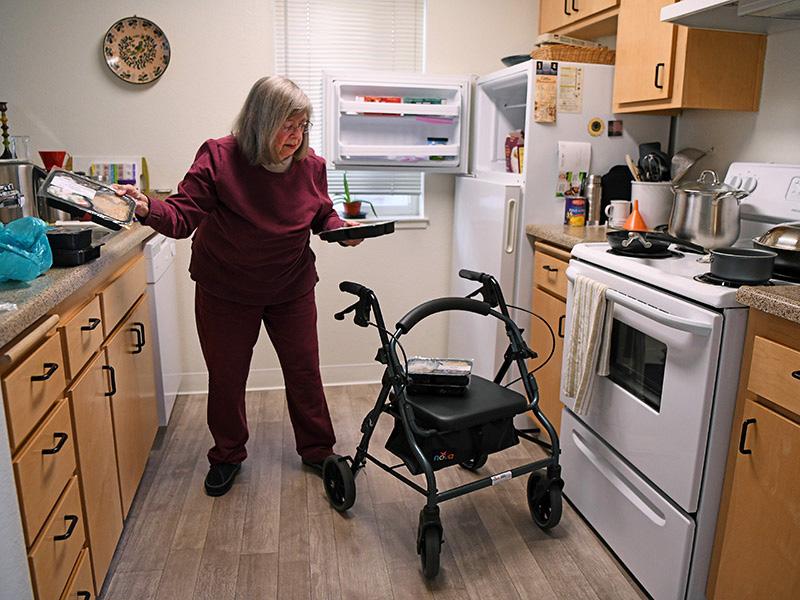





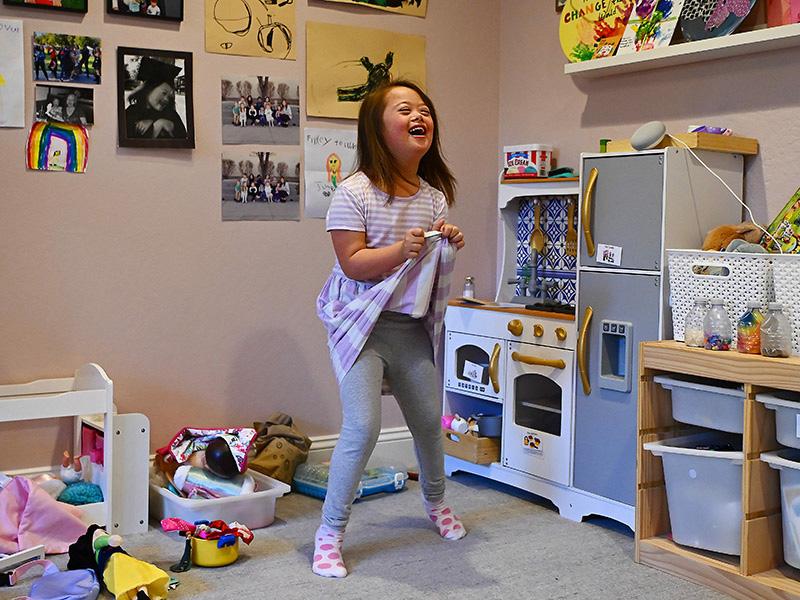

By Harry Harris hharris@bayareanewsgroup.com
Meals on Wheels Contra Costa has a reputation among its clients for being a lifesaver.
The mission of the 34-year-old organization, which serves some 800,000 free meals annually to 3,600 seniors, is to “support homebound elders to maintain their health and dignity, and enable them to live independently in the comfort and security of their own homes,” as well as “to aid nutritionally at-risk senior citizens who have challenges that prevent them from preparing nutritious meals for themselves,” according to the organization’s website.
“Meals on Wheels Contra Costa has earned its reputation as a lifesaver because the service we provide is vital to the well-being of homebound seniors,” said Executive Director Cassandra Miranda. “For many, we are their connection to the outside world, their source of nutrition, and often their safety net.”
Client Karen Paluzzi, 91, of Pinole, firmly believes the organization has become essential for her well-being. Meals on Wheels, she says, “keeps me alive. I’m a very big fan of Meals on Wheels. It’s very worthy and provides a lot of benefits for seniors.”
Paluzzi, who lives alone, fractured her spine in 2016 and most recently was injured in a car crash. She says Meals on Wheels has helped her maintain her independence, stay healthy and avoid feeling isolated. She said the connection with her volunteer drivers has been just as valuable as the meals. In Miranda’s eyes, what makes Meals on Wheels Contra Costa even more special is the way it brings the entire community together.
“The program is powered by a network of volunteers, donors, and local partners, each contributing something essential,” she said. “It’s a testament to the strength of a community when people from all walks of life come together to care for their neighbors.”

Donations will help Meals on Wheels of Contra Costa to provide approximately 4,375 nutritious meals to approximately 625 homebound seniors currently enrolled in the program countywide.
Goal: $35,000
By Jovi Dai jdai@bayareanewsgroup.com
When Myhanh Lopes was just 17 years old, she had to choose between working to support herself and her new baby and finishing high school. She chose her family.
After quitting high school, Lopes, 54, of Pittsburg, started a retail job where she worked for more than 30 years. But it was a demanding job and often cost her precious time with her family. So during the COVID-19 pandemic, she sought to improve her skill set and find a job with a better work-life balance.
“We had to grow up quickly and figure things out to get by,” she said of herself and her then-boyfriend, now her husband, with whom she raised three children. “I grew with the company in a sense, but I also gave up being with my little kid’s birthday parties and being unable to take them to after-school sports.”
Lopes enrolled in an Administrative Careers Training, or ACT, program with Opportunity Junction, a nonprofit that provides health care and office administration training, support, work experience and placement assistance to motivated Contra Costa County job seekers. It helps those facing personal and systemic employment barriers launch careers that lead to financial security.
After working hard on the ACT program, Lopes obtained the Microsoft Office certification.
She now works for another nonprofit, SHELTER, Inc., as a program specialist, where she uses her new skills to prevent homelessness and provide shelter for veterans and their families.
Lopes emphasized the importance of self-belief and inner strength.
“It’s never too late to try something out of your comfort zone,” Lopes said.

Donations will help Opportunity Junction to provide students with 50 Thanksgiving meals and 270 $50 holiday gift cards. The remainder will fund paid internship experiences for program graduates as well as individual financial support to individuals through transportation subsidies, rental help, and phone and internet bill assistance.
Goal: $30,000
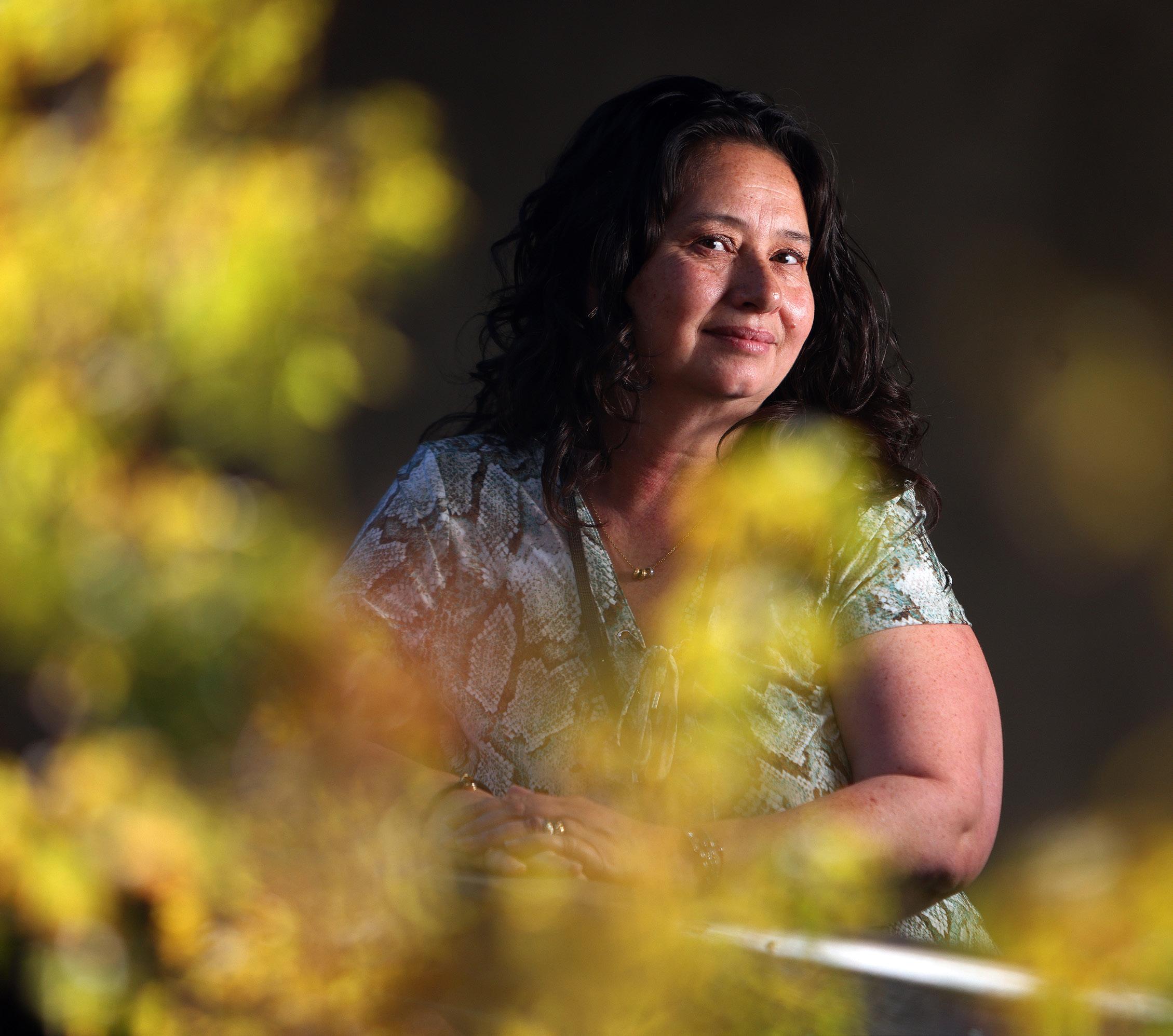

By John Metcalfe jmetcalfe@bayareanewsgroup.com
Much has been written about the ridiculous prices in the U.S. healthcare system. What’s lesser known is that animal healthcare has its own sky-high costs.
“It can cost $1,200 to spay one female dog, easily. It’s a lot of money. Some people do it, and many don’t — often just because they can’t afford it,” says Lisa Williams.
Williams is the cofounder and medical programs director for Paws in Need, a San Ramon-based nonprofit devoted to narrowing the gap between impossible and affordable veterinary care. Serving cats and dogs in the TriValley area, Paws in Need offers small grants to pet owners to help defray the costs of crucial medical services: spaying and neutering, primarily, but also medications and surgical procedures like tooth extractions and tumor or limb removals.
Founded in 2013, the organization has helped provide vet care to more than 7,000 dogs and cats suffering from injury, disease, neglect or abandonment.
As Paws in Need has grown, so has its mission. The organization now helps rehome abandoned and neglected animals, answering direct calls from the public — something rare in the bureaucracy of the animal-welfare world — and wrangling personal connections with low-cost veterinarians, animalcontrol officers and managers of rescues and sanctuaries.
This year, for instance, Paws in Need helped remove a sweet, thick-asa-brick, two-year-old bulldog named Crystal from an overcrowded backyard kennel in Contra Costa County. “We got the severe infections treated, got her fleas under control and got her inoculations,” said Williams.
Crystal wound up the happy resident of the Coyote Crossing Ranch Animal Rescue and Sanctuary in Byron, before eventually being adopted into her forever home.

Donations will help Paws In Need to facilitate spay and neuter procedures for 100 dogs or puppies and 125 cats or kittens, for total assistance to 225 animals that would otherwise not receive the proper veterinary care.
Goal: $10,000
By George Avalos gavalos@bayareanewsgroup.com
White Pony Express aims to chip away at food insecurity in the East Bay by finding ways to get surplus — yet high-quality — food into the hands of those who need nutritious sustenance.
Since 2013, it has been working to obtain excess food from operators such as grocery stores, restaurants, farmers markets and wholesalers. The East Bay nonprofit believes that little by little, it can make a difference in the battle against hunger.
“We try to connect food abundance in Contra Costa County with those in great need of healthy and nutritious food,” said White Pony Express Chief Executive Officer Eve Birge.
The Concord-based nonprofit has created a network to make these connections more efficient.
“Our Food Rescue Program recovers a daily average of 12,000 pounds of high-quality food from grocers, farmers markets, restaurants, and wholesalers,” the nonprofit states on its website.
After gathering the surplus food, the nonprofit’s workers and volunteers bring it to its distribution centers for sorting.
Antioch Unified School District is among the recipients of the nonprofit’s efforts to bring food to those in need. Lindsay Lopez-Wisely, the district’s director of secondary education, believes White Pony Express is making a significant difference.
“We are seeing more struggles for families these days, with inflation, high food prices,” Lopez-Wisely said. “We are very grateful for our partnership with White Pony Express.”
White Pony Express has set up school pantries at 16 locations in Contra Costa County. At least 80% of the students qualify for free or reduced-price lunches through the pantries, which operate on a school campus once or twice a week.

Goal: $10,000 HOWTOHELP
Donations will help White Pony Express expand its 16-school School Pantry Program and begin to reduce its 70-agency waitlist. The program, which currently serves 35,000 children, provides fresh, wholesome, ready-to-eat food at schools where 80% or more of students qualify for free or reduced-price lunch.
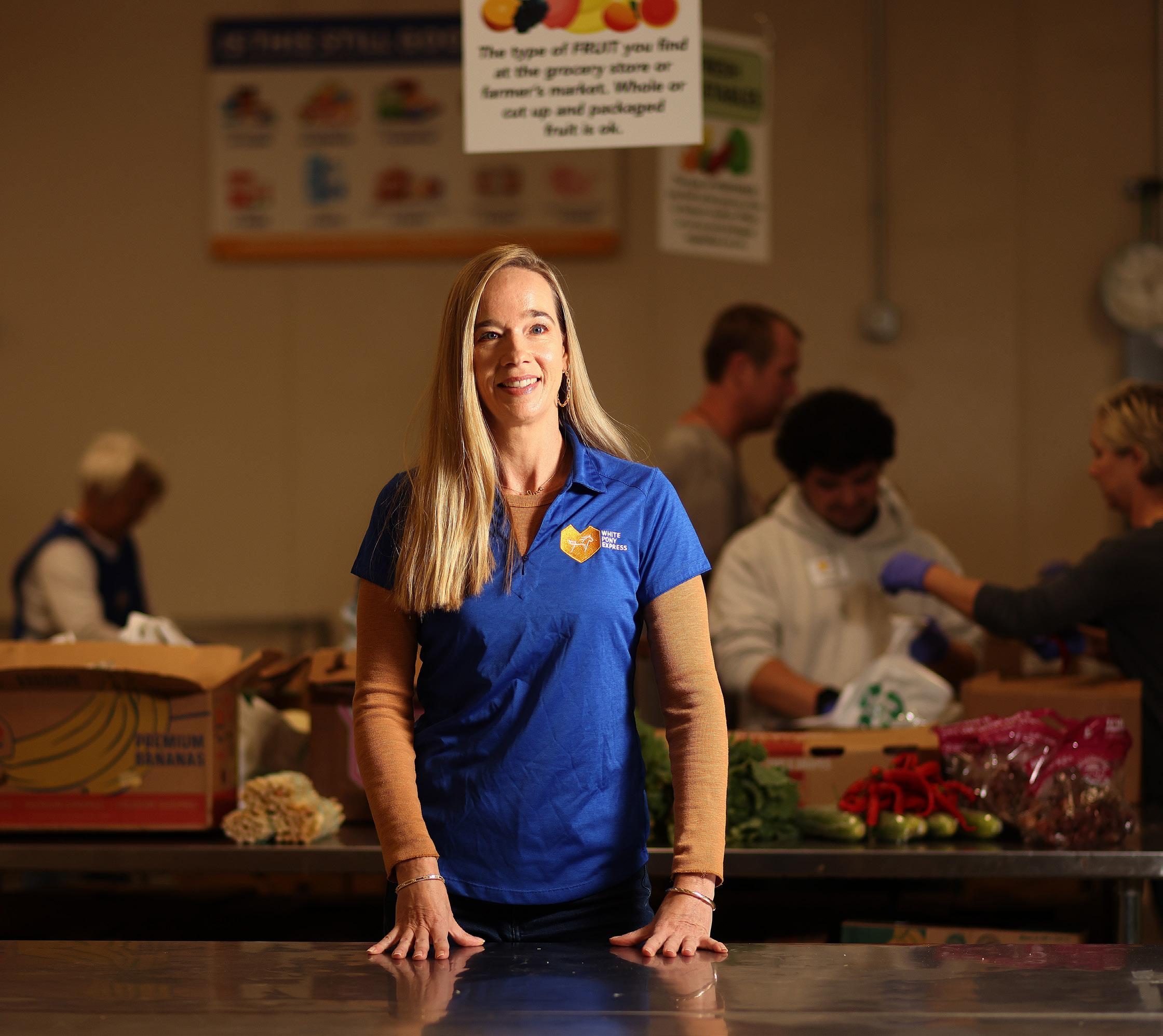

By Kate Talerico ktalerico@bayareanewsgroup.com
They drew the line at getting high in the same room as their three-year-old son.
Never went that far, no. Anastasia and James Burke ensured that Liam was away from the needles, the fentanyl, their friends — if they could use that term, “friends,” for the people they’d crash with when they were using, all holed away in the same “trap house.”
It wasn’t just one wrong decision, of course — but the same decision, repeated in a cycle. Until this summer, when the couple decided to quit.
In June, Anastasia had James drop her and Liam off at a rehab clinic. Six days later, James checked himself into a treatment center, too.
When their programs ended in August, they weren’t sure where to go. Both had attempted sobriety before and know how precarious it can be.
Anastasia’s recovery counselors put her and James in touch with Shelter Inc., a nonprofit that runs several homeless shelters around the Bay Area. Shelter Inc. offered the Burkes a private room at the 32-bed Martinez family shelter, where they could stay with Liam and chart out a path forward.
The Burkes moved into the shelter in August. The days are full — breakfast, chores, daycare for Liam and support groups for the adults, homework, dinner. So far, both James and Anastasia have managed to stay the course.
This October, both James and Anastasia marked 100 days of sobriety, an accomplishment they say wouldn’t have been possible without the stability offered by Shelter Inc.
“I’m just grateful for places like this, because when we were out there, we couldn’t do it,” James said. “We didn’t have nowhere to go, we didn’t have no money, no feet to stand on. And it’s hard when it’s like that, especially when you got a little kid that you’re trying to feed with no money. … but I’m just really grateful I’m not in that dark place anymore.”

HOWTOHELP
Donations will help Shelter Inc. support the housing needs of 26 individuals in 11 families, including 12 children, for one month of shelter operations costs at Mountain Valley Family Shelter in Martinez.
Goal: $25,000
By Jakob Rodgers jrodgers@bayareanewsgroup.com
For Cecilia Schonian, one of the hardest parts of living in her car was simply finding a place to park.
She learned to avoid malls and shopping centers, where security guards quickly rousted alleged loiterers. Instead, she sought out the well-lit parking lots of hotels and motels across the East Bay. Once there, she’d peer out of her windows with a dash of envy at people sleeping indoors just feet away.
The turning point came when Schonian, 37, walked through the front doors of Swords to Plowshares, an organization with 50 years of experience helping homeless and impoverished military veterans such as herself.
“It just felt like I was at home,” said Schonian, who served for five years in the Air Force as an active-duty airman, as well as another two years in the Air Force Reserves, before leaving the service with untreated post-traumatic stress.
Just last year, the nonprofit helped more than 3,100 military veterans, according to its 2023 annual report. Nearly 45% of those people had been homeless when they sought help, having spent an average of more than three years without a permanent indoor place to live.
Many of those people were placed into one of the nonprofit’s 500 housing units that it operates across the Bay Area, while others were offered rental assistance. The nonprofit also helped connect veterans to mental health care, doled out more than 100,000 meals and distributed nearly 1,000 gun locks to help stem the tide of suicides among former military service members.
Nearly a year after first visiting the nonprofit, Schonian lives in her own apartment and works at the organization’s Oakland Service Center. For Schonian, the goal is to help other military veterans escape that same cycle of homelessness that led her to the nonprofit.

Donations will support Swords to Plowshares’ Oakland Service Center, which provides direct services for 500 East Bay veterans annually. Funding will help meet 100 veterans’ basic needs by providing emergency housing, food and gas vouchers, hygiene kits, and holiday backpacks.
Goal: $35,000

JANE TYSKA — STAFF PHOTOGRAPHER
Air Force veteran Cecilia Schonian, 37, of Pleasanton, says she found her home at Swords to Plowshares after being homeless. Now she works at the nonprofit that also helped her. Here she fills out paperwork with Air Force veteran Todd Williams, of Oakland.

By Hema Sivanandam hsivanandam@bayareanewsgroup.com
Michelle Crossley found her way from the streets to stability with the help of Society of St. Vincent de Paul of Contra Costa County.
Crossley was homeless for many years on the streets of Rodeo and witnessed violence and loss during that time. But her battle with addiction made it difficult for her to leave the streets until she met her fiancé Michael Hyche, who stood by her constantly.
The day Crossley discovered she was pregnant with her daughter Imani, who is now 3 years old, her life took a turn. Thanks to the support of compassionate doctors at a local county hospital, Crossley began her journey toward sobriety.
A few months after Imani was born, Crossley continued her recovery with the help of Ujima Family Services and the Society of St. Vincent de Paul. She enrolled in daily outpatient recovery programs and Narcotics Anonymous. Still, postpartum depression set in, leading to a brief separation from her daughter when Imani was temporarily placed in foster care.
Crossley connected with Cindi Collins Erickson and Barbara Hunt from St. Vincent de Paul, who provided essential support such as diapers and baby supplies.
Determined to keep her daughter, Crossley, who also suffers from multiple sclerosis, went above and beyond, enrolling in extra parenting classes and therapy sessions.
Her hard work paid off when a judge granted reunification services. Crossley is a proud mother and is determined to give back to the community that helped her.

HOWTOHELP
Donations to the Society of St. Vincent de Paul of Contra Costa County will support the purchase of 200 familyfriendly gift cards, providing food for approximately 800 people.
Goal: $15,000
4
Everyone deserves joy this time of year. Help spread the love this holiday season with a gift to Share the Spirit.
Support causes you care about by donating or volunteering. Make a difference in others’ lives and contribute to a better world.
2 Personal Connection
When a cause resonates deeply with us, personally or through someone we know, donating to nonprofit organizations empowers us to transform our emotions into impactful actions.

4 Crisis Response
In the face of disaster, nonprofits promptly mobilize, offering vital aid, relief, and support to impacted communities. Your generous donation enables a swift and impactful crisis response to those in dire need.
7 TaxDeductible Contributions are a vital part of the economy.
3 Improve Awareness of Local Issues
Charitable donations and volunteer work raise awareness of local issues like food insecurity and homelessness, inspiring others to join in and strengthen community support for those in need.


6 Inspiration and Legacy
Your charitable actions serve as a catalyst, motivating others to engage in acts of kindness and leave a profound and positive impact on society.
Local communities rely on the services and resources provided by nonprofits to thrive. Your contribution has a profound impact on your community, enriching the lives of its members and promoting overall well-being.
When you donate to an IRS-approved nonprofit organization like Share the Spirit, your gift is tax-deductible. It may not be the main reason you give, but it can be a nice side effect.